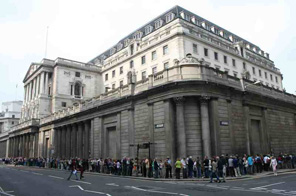Bank of England seeks more money from govt
LONDON: The Bank of England is expected to ask the British government for the authority to pump another 25 billion pounds ($40 billion) into the financial system at the end of its two-day monthly meeting Thursday.
The central bank's monetary policy committee is also expected to keep interest rates unchanged at a record low 0.5 percent.
The bank, after what many thought was a slow response to the financial crisis and the ensuing recession, has been very aggressive since October, cutting interest rates in quick-fire succession from 4.5 percent to 0.5 percent in March and instigating so-called quantitative easing, or QE.
Under the programme, the bank has committed to buying up to 125 billion pounds of assets, such as government and corporate bonds from financial institutions in the hope they will start lending their new money to households and consumers.
The policy is also designed to prevent a dangerous spiral of falling prices from emerging by increasing the amount of money circulating in the economy - though inflation in the year to May stood at 2.2 percent, above the Bank's 2 percent target. The inflation rate is expected to drop sharply in coming months amid falling commodity prices and a deeper than expected recession.
The Bank of England is expected to confirm Thursday that it has nearly exhausted the 125 billion pounds it was first allocated in March and is looking to raise the ceiling to 150 billion pounds - the maximum level currently authorised by Britain's finance chief Alistair Darling.
Analysts said the likelihood of an expansion in the money boosting measures has increased in recent weeks as inflationary pressures in the economy appear to have eased and figures showed that the British economy contracted by 2.4 percent in the first quarter of 2009 from the previous three month period, way more than the previous estimate of 1.9 percent.
"Lower GDP estimates, disappointing monetary data and a rising pound provide good fundamental reasons for the committee to sanction more QE, but there is also a tactical reason," said Philip Shaw, chief U.K. economist at Investec Securities.
Shaw warned of an "unnecessary disruption to the process" if the Bank of England waited until August to get its hands on the additional 25 billion pounds because at the current rate of purchases, it looks like the 125 billion initially sanctioned will have been used up by the end of July.
"From the point of view of continuity, it might be beneficial to act now," Shaw said.
The markets will also be interested to see if the nine-member rate-setting panel requests a higher limit from Darling so it can have more firepower just in case the British economy takes a turn for the worse or prices begin to fall.
Though recent forward-looking economic indicators have suggested that the scale of contraction in the British economy has eased - on Tuesday leading business lobby group the British Chambers of Commerce said the worst of Britain's recession was over - there are no guarantees that any recovery will be long-lasting or self-fueling.
Last month, the Bank of England's governor Mervyn King told lawmakers that he was "more uncertain than ever" about the state of the economy, reinforcing market expectations that interest rates will remain at their super-low levels until well into 2010 and that the Bank would be asking for more financial headroom from the government.






